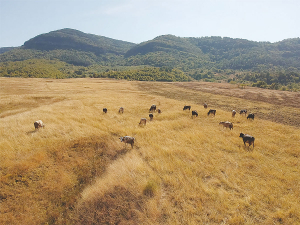Early summer stress risks dairy cow pregnancy success
By the time you are reading this, most spring-calving herds will have finished the main mating period.
 Heat stress in cows occurs when they are producing more heat than they are able to get rid of through sweating, respiration, or air regulation.
Heat stress in cows occurs when they are producing more heat than they are able to get rid of through sweating, respiration, or air regulation.
Heat stress in dairy cattle is probably the most overlooked seasonal problem here in New Zealand.
Production drops rapidly as the heat increases, and most farmers simply accept this as a normal seasonal issue that they are powerless to address.
The truth is, there are a number of nutritional strategies that can be used in order to mitigate the effects of heat stress.
It is a well-known fact that cows generate heat in order to create the energy to produce milk, and during the summer this will be out in the paddock in the heat of the sun. Heat stress in cows occurs when they are producing more heat than they are able to get rid of through sweating, respiration, or air regulation.
An overabundance of heat in cows can lead to higher levels of stress, which will affect milk production, fertility, as well as increase the risk of other diseases such as lameness, and can also impair immune function.
Untreated heat stress can be fatal, which is why it’s vital to understand the signs of heat stress, and the best ways in which to prevent it. Watch for changes in behaviour, such as seeking shade, panting, drooling, and standing in water or next to troughs, as signs that your cows may be experiencing heat stress.
When cows are suffering heat stress, feed intake is reduced. This will be accompanied by increased panting and drooling culminating in less saliva reaching the rumen, this decreases rumination by disrupting rumen pH. A healthy rumen is needed for milk yield as well as animal health.
It is therefore important that ruminant animals during periods of high humidity are provided with sufficient nutrients in order to counteract heat stress and maintain strong immunity.
By providing your herd with an easily digestible, nutrient-packed animal tonic that can be blended easily into their feed or added into their water, you ensure that they have the correct balance in place to mitigate the effects of this summer heat stress.
Chris Balemi is managing director, Agvance Nutrition Ltd
New Zealand's new Special Agricultural Trade Envoy, Horowhenua dairy farmer, company director and former Minister of Agriculture, Nathan Guy says the Free Trade Agreement (FTA) with India is a good deal for the country.
New figures show dairy farmers are not only holding on to their international workforce, but are also supporting those staff to step into higher-skilled roles on farm.
New tractor deliveries for 2025 jumped 10% compared to the previous year, a reflection of the positive primary sector outlook, according to the Tractor and Machinery Association (TAMA).
Entries have opened for two awards in the New Zealand Dairy Industry Awards (NZDIA) programme, aimed at helping young farmers progress to farm ownership.
Federated Farmers has confirmed interim chief executive Mike Siermans to the role.
Registrations are now open for the 2026 Ruralco Golf Classic, with all proceeds from the event set to support the Mid Canterbury Rural Support Trust.